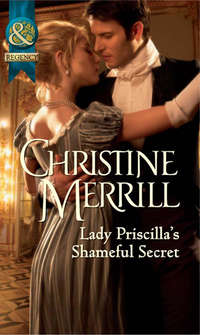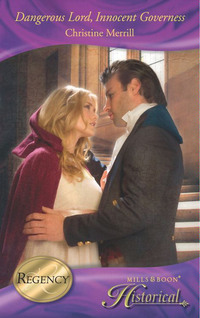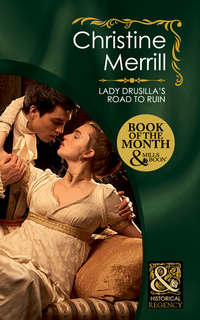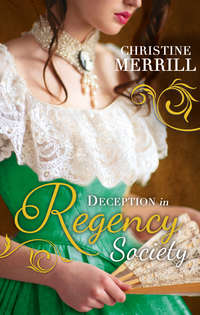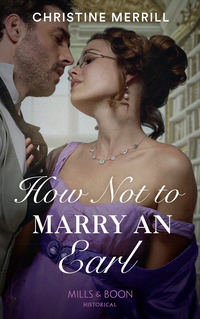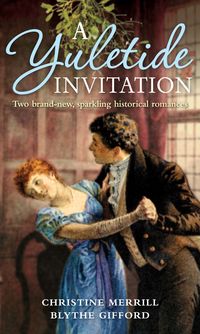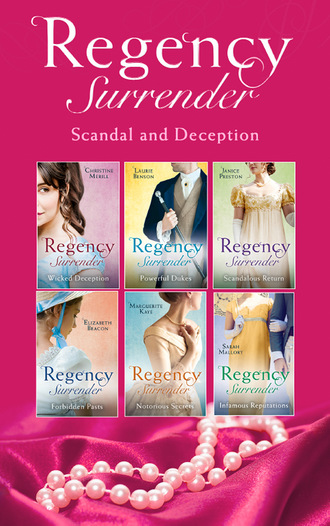
Полная версия
Regency Surrender: Scandal And Deception
He had created his own hell.
He said nothing. To speak was to give her ammunition. Instead, he tossed his napkin on the table and left the room.
Chapter Sixteen
Margot crumpled the note in her hand. She had not seen her husband in days. And now he chose to communicate in writing. It was outside of enough. The worst of it was, she had no idea what she had done to make him angry again.
In her opinion, things had been going quite well. They had proved they were more than compatible, once the lights were out. And after speaking with his sister, some of her reservations about the marriage had been laid to rest. There was still much to discuss, of course. She still did not understand the matter of the necklace.
But to discuss, both parties had to speak. And for some reason, he had gone from speaking little, to not speaking at all. She had no idea what she’d done to cause the change.
She’d returned home early, specifically to please him. They’d dined at the table and she had dressed in a manner befitting the wife of a great man. If he could find nothing good to say about her, the least he could have done was remark on the food. The cook had outdone herself and the quality of her portion had been the equal of his. A single taste of her plate would have proved to him that he would not have to involve himself in domestic strife or the running of the house. She was perfectly capable of managing the staff on her own.
Her efforts to please him had been for naught. He’d stared at her over dinner as if he’d never seen her before. Then, with no warning and not a word of explanation, he had got up from the table and abandoned her.
She had assumed that they would have time later, in bed, to talk. She had even planned to playfully remind him that he was still entitled to one more night of her company. But he had not been in his room when she had gone to bed. Even though she’d arisen early the next day, he was not there. It looked as if he had not come to bed at all.
And so it had gone, for several days. To question the staff about the location of her husband after only a week of marriage would embarrass her in front of servants that had only just come to accept her as mistress. And as it had repeatedly over the last few weeks, she felt the creeping suspicion that he’d got all he wanted from her, and had lost interest.
Now, this. A curt note reminding her of her sister’s reception, this evening, and his request that she be dressed and ready to accompany him at eight. Apparently, though they did not speak in private, they were to be a happy newlyweds in the eyes of the world. And he expected her to be the beautiful ornament suitable to a man too proud and well born to have an ordinary wife.
If he meant to escort her in silence, it would be an even greater ordeal than she had expected. Margot had more than enough time to visit with Louisa, since customers continued to avoid the shop. But this morning, the girl had informed her, as gently as possible, that the family would not be attending this evening’s festivities. It was quite possible that her visits to the shop would end, as well. Now that the Duke and Duchess of Larchmont were in Bath, they would expect their daughter to stay with them and not with the cousin she had been visiting. Since it had been decided that Larchmont and his lady would not be attending the reception, Louisa had little choice but to remain at home with her needlework.
So, his family was not willing to celebrate the union. If the ledger book told a story, the rest of Bath meant to avoid her as if she had some contagious disease. If no one liked them, then why were they bothering to play-act their happiness? Perhaps she would simply ignore his command and pretend she had forgotten the invitation. She would work later than usual, even if it meant sitting in an empty shop.
Then she remembered Justine, so eager for her happiness that she had orchestrated the wedding, and the party to celebrate it. If the evening was a poorly attended disaster, it would be up to Margot to console her sister, thank her for her efforts and pretend to be happy, just as she planned to do in her marriage. And, if Fanworth wished for nothing more than a beauty, she would give him what he deserved.
* * *
She arrived home even earlier than necessary and ate a hurried supper alone before giving herself over to the ministrations of the maid whom her husband had hired for her. The gown they chose was the green of spring leaves, with a deep hem embroidered with white-and-gold flowers. The maid dressed her hair so that tendrils wound down about her face like so many vines in an overgrown wood. Margot had to admit, the finished look was striking. There was something faintly pagan about it, as though a nymph had been dragged from the woods and forced to marry well.
She smiled at herself in the mirror. If the town gossiped that Fanworth had married beneath him, at least there would be no question as to his reasons. And she had just the jewellery to match it. She directed her maid to get the ebony box from my lord’s room.
As the door to the connecting room opened, she could hear him on the other side of the suite, swearing quietly as his valet dressed him. It surprised her that the son of a peer had such a diverse and vulgar vocabulary. But he used it with confidence, for there was not a trace of a stammer as he complained about the tying of his cravat.
The cursing ceased as her maid entered and requested the jewels. There were a few more moments of profound silence. Then Fanworth stood in the doorway, cravat still hanging untied about his neck, shirt open at the throat and the ebony jewellery box in his hands. He was staring at her with the same hungry expression he’d had at the dinner table, before everything had gone wrong.
Perhaps he had only wanted her for her beauty. Then she would desire him for his handsomeness. She was sure that, at this moment, they were both thinking the same thing. If they dismissed the servants, she could go to him, lick once against the bare skin of his throat and they would not leave the house or the bed until morning.
He stepped forward and the spell was broken. When she reached for the jewellery box, he held it just out of her reach. ‘Allow me.’
Only two words. But they were the first she’d heard from him in days and they struck right to the heart of her. With a casual flick of his finger, he opened the box, reached into it, and removed the necklace she wanted: a narrow band of gold leaves, set with pavé emeralds. His fingers trailed along her skin, circling her throat as he fastened it.
Why could he not speak to her the way he touched her, as if she were the most precious gift in the world? Now he was affixing the matching drops to her ears, his index finger drawing lightly along the shells before settling on the lobes, sliding the wires into place.
She turned to look into the mirror, if only to distract herself from his touch. Her throat tightened at seeing her work reflected back to her. At last, these pieces would be worn in public, just as she had intended. She would see, first-hand, if they were admired.
Fanworth reached out and took her gloved hand, kissing the knuckles before slipping a bracelet on her wrist. It was the emerald viper he had bought on the first day.
She looked down at it, worried. ‘Surely this is too much.’
He shook his head and smiled. ‘Eve needs a serpent.’
Did he still think her a temptress? If so, he had been resisting well enough lately. But he was right. The bracelet did go well with the gown. And then she remembered the story. ‘Eve was...’ Not wearing a gown.
His glance swept her body as though he could see through the silk to the woman beneath. ‘Later, you may keep the bracelet on,’ he said, smiling again. Then he returned to his room to finish dressing.
* * *
While the assembly room was hardly full, it was not the barren wasteland that Margot had feared. The Duchess of Bellston greeted her with a warm kiss upon the cheek and compliments on both her marriage and her appearance. The duke smiled and kissed her hand, then exchanged properly sombre greetings with Fanworth as they took their places in the receiving line.
Though she had been to a few routs with her sister, Margot had never been in such high-born company, much less an honoured guest. Then, she remembered her husband held precedence over all in the room but the duke. She must learn to behave as the duchess did, polite, friendly and confident in her place.
If any guests came with the intent of offering a snub, they were properly subdued by the obvious warm relationship the new marchioness had with Bellston and his duchess. Some even dared to enquire, politely, if the jewellery she was wearing was from her own shop.
She acknowledged that it was so. She had designed it herself. In response, she saw speculative looks on the faces of some of the ladies, as though trying to decide if the social awkwardness of greeting the Marchioness of Fanworth from across a shop counter was greater than their desire to be the first of their friends to own one of her pieces.
Beside her, Fanworth greeted both the ladies and their husbands with a cool smile and as few words as was possible. When compared to his disdain, she looked all the more approachable. And to her surprise, the looks cast at her by some of the ladies in the room changed from suspicion to pity. They seemed to be imagining how difficult life would be, in the presence of such a cold and unfeeling husband.
She had been thinking such a thing herself, only this morning. But then she remembered their wedding. There was a lull in the crowd and she glanced at him now, noting the slight frown that creased his forehead and the way his lips pinched in the tightest possible smile. He was not sure what might escape should he relax and speak freely.
This continual wariness must be as exhausting for him as it was frustrating for her. And it must be very lonely. Without thinking, she reached out and touched his sleeve to remind him that she was still by his side.
He started, looking down at her, as though he had forgotten her presence. Then, ever so slightly, his brow seemed to relax and his smile became less threatening. Perhaps she was more to him than a warm body in his bed. He had chosen her to be his life’s companion.
When he had visited her in the shop, he had willingly shared his soul. If he could not manage a few simple hellos at a time like this, there was no way he’d have been so open to her, just to bed her. He had loved her, just as she thought. For this union to succeed, they must find their way back to that place of communion.
The first step would have to be hers. She let her hand remain in the crook of his arm. Let him think that she needed his support, if it was easier for him. Perhaps it was true. But it was equally true that they needed each other.
In response, he moved an inch closer to her. And at the approach of the next gentleman in line, his other hand covered hers. The man in front of them bowed and, though he was a stranger to her, greeted her with an overly familiar smile.
She felt her husband stiffen again, as he made the introduction. ‘Lady Fanworth? Lord Arthur Standish.’
She should have recognised him without Stephen’s help. Now that she had reason to look for it, the similarity between the men was marked. But the younger brother’s good looks were spoiled by the fading blue circles under his eyes and a nose which was still a little swollen.
‘How do you do?’ she said, offering a hesitant smile.
‘Not as well as you, I think,’ Lord Arthur said. Unlike her husband’s superior smile and distant manners, there was something wolfish about Arthur. She suspected, if he should grin, he would show far too many teeth. Then, as suddenly as he had come, he disappeared into the crowd and they were greeting the next couple.
Once the majority of guests had arrived and the line dissolved, Stephen parted from her with little more than a light touch on her hand and a sympathetic smile. Apparently, she was to be left to her own devices while he did whatever it was a marquess did at such gatherings. If his current behaviour was any indication, they stood disapprovingly against a wall, avoiding other people.
She looked back at him and frowned. Something would have to be done about that. But now was not the time to find a solution. At least he had his brother to talk to. Lord Arthur was beside him, speaking to him as though there was nothing unusual in his behaviour.
It was wrong of her to take such an instant dislike to a person. But there was something about her husband’s brother that unnerved her. When he was not at her husband’s side, she found herself searching the rest of the room for him, as if she feared the mischief he might create if he was not always in sight. When she could not find him, the raised hairs on the back of her neck told her that he was somewhere nearby, watching her.
Perhaps she was right. After she had not seen him for some time and was almost convinced that he had left the room, he appeared before her wearing the same predatory smile he’d shown at their introduction. ‘Lady Fanworth.’
No matter what her feelings, this man was her husband’s brother. She had little choice but to respond politely. ‘Lord Arthur.’
‘It is a shame that it has taken so long for us to meet. We are family, after all.’
‘You are Stephen’s brother.’ It was hardly necessary to state that fact. But somehow, she could not muster a warmer acknowledgement of their connection.
‘That I am,’ he agreed. But the way he was looking at her was not in the least bit brotherly. ‘I must admit, Stephen has excellent eyesight, if dubious taste. You are the most handsome woman here.’
An insult wrapped in a compliment did not warrant a response, so she remained silent.
‘It is a shame we have not met before now,’ he said. It was an innocent statement, but the ironic glint in his eye said something far different.
‘I suspect there is a reason for it,’ she said, glancing out over the room and taking a sip of her wine. If he had truly wished to meet her he could have searched her out, just as Louisa had.
Arthur laughed in surprise at her sarcastic response, but he did not leave. ‘Perhaps it is because I do not frequent any but the best merchants.’
It was one thing to insult her and quite another to insult the shop. ‘Then it is fortunate that I do not need your patronage,’ she said.
‘Of course you do not,’ he agreed. ‘You have married well enough that you need no one’s help.’
‘It was not my plan to do so,’ she said.
‘Of course not. We have my besotted brother to thank for this union. I told him it was unwise.’
And it appeared he had got a punch in the nose for his trouble. She glanced across the room at her husband who stood as impassive as a statue against the opposite wall. ‘Fanworth has a mind of his own.’
‘Would that he was less stubborn. He has overstepped himself, this time. Larchmont will never accept you.’ He looked her up and down again as though the flaw in her character were somehow worn on the outside, for all to see.
‘What’s done is done,’ she said in response. ‘He cannot exactly un-marry me.’
‘I suppose not.’ Now he was quite obviously admiring her body. ‘If I were married to you, an annulment would be impossible. And I have heard that the lower classes do have a greater appetite for certain things than the milk-and-water misses you find at Almack’s.’
When one had customers, one grew used to accepting insults with a smile and not responding to them as they deserved. But Louisa had been right. Lord Arthur Standish deserved to be struck, hard and often. Before she could stop herself, Margot had given him a hard slap to his broken nose.
With a curse that was heard by half the people in the room, Arthur doubled over, cupping his offended proboscis in both hands. All conversation stopped as heads snapped to look in their direction. And then it began again. The crowd swirling like stirred tea as those who had seen informed those who hadn’t that the new Marchioness of Fanworth had raised a hand to her husband’s brother.
Arthur straightened, glaring at her and mopping at the trickle of blood that dripped from his re-injured nose. ‘Pratchet was right. When I sold him the rubies he said you were every bit as stubborn as Stephen. Since neither of you would choose the sensible course, I hope you are both satisfied with the results.’
‘Infinitely.’ Margot felt the reassuring touch of her husband’s hand on her arm. ‘So nice to see the family represented, Arthur.’ There was a long ironic silence. ‘If you will excuse us?’ Then, with a gentle tug on her elbow, Stephen led her away.
* * *
Catastrophe. Fiasco. Calamity.
When one had the time to think, there were many words to describe the evening other than disaster. Judging by the way Margot was slumped in the carriage seat opposite him, she had thought of all those and more.
In Stephen’s opinion, it could have been far worse. It was fortunate that they’d not met his parents, as he’d expected. If Arthur was any indication, he had been naïve to assume Larchmont capable of good behaviour. More likely, he’d have thought it good sport to humiliate Margot as Arthur had tried to do. While she’d proven capable of handling difficult servants and annoying younger brothers, the duke would not be so easily dispatched.
Her victory tonight had not come without cost. After Arthur had gone home to tend his injury, Stephen had remained by her side, to make it clear to the crowd that his sympathies lay with his wife. But as the evening wore on, she smiled less and spoke hardly at all. It was as if, by marrying her, he’d infected her with his own form of misery.
She had not said a word to him since they’d departed the assembly rooms, staring out the window of the carriage without really seeing the streets they travelled. ‘I am sorry,’ she said suddenly, not turning her gaze to meet his. ‘So very sorry. I never intended... It just happened.’ Her hands gave a helpless flutter, then covered her face.
‘I understand,’ he said.
‘Louisa was right.’ The words came muffled from between her fingers.
‘How?’
‘She said you had struck your brother. But that he sometimes deserved to be hit. I did not give it much thought. And then...he began speaking to me...’ She shrugged, unable to continue.
‘Normally, when we Standishes strike each other, we do so in p-private.’ The truth sounded even worse when stated thus.
But she looked up at him, with a surprised smile. What had he said to put such hope on her face? ‘You are not angry with me?’
‘I am angry with myself,’ he admitted. ‘I should have kept him away from you.’ He reached across the space between them and gave her hand an encouraging squeeze. ‘What did he say?’
‘I will not tell you,’ she answered, with a stubborn shake of her head. ‘Or you would likely want to hit him a second time.’
‘I will do so anyway, if he annoys you again.’ And he would do so, gladly. When he looked at her, he felt a fierce wave of protectiveness. It was as if he had been given a fragile ornament to hold, only to see his brother try to snatch it from his hands and destroy it. Now, he must do whatever it took to teach Arthur that this was not some playroom tussle over a toy.
‘Why did you hit him the first time?’
‘Eh?’ His lady wife was looking down at the hand that held hers, rubbing her thumb along the inside of his wrist. It was a simple touch that probably meant nothing at all to her. But at this gentle friction, he could hardly remember his own name, much less hold a conversation.
‘Why did you strike your brother? Louisa said it happened before we were married. She said you would not have him at the wedding. And tonight, there were still bruises.’
Had Arthur lied about the reason, implying he was some sort of bullying brute? He chose an answer that was vague and dismissive. ‘He meant to cause trouble between us.’
‘It was about the rubies, wasn’t it? Tonight, after I slapped him, he admitted he was the one who sold them. I was wrong about you.’
‘And I you.’ It seemed he took the first deep breath in ages. If she knew this much of the truth, the rest was child’s play. He took her other hand and gathered them both to his lips for luck before speaking. ‘The day I realised you b-blamed me for the theft, I spoke to P-Puh-Pratchet. He ran off, or he might have explained it all...’ He squeezed her hand again. ‘It was Arthur, all along. When I showed him the necklace you had made, he’d said you must have stolen the stones. Sold them b-back to me as a joke...’ His words were full of embarrassing halts and stumbles. But she did not seem to notice. She was leaning forward, listening patiently, just as she used to.
He kissed her hands again. ‘I was angry with you for no reason. I had to marry you. I mean, I wanted to marry you. From the first. B-But now, I had to. Quickly. To make up for what I had done. And you would not speak to me.’ He was making a mess of it again. It was what came of speaking without preparation. He was getting ahead of himself.
‘And you hit Arthur?’ she prompted.
‘After P-P-Pratchet. Before the wedding. B-because he deserved it.’
‘Why would he do such a horrible thing?’ Why indeed? She had done nothing to deserve such elaborate plots against her, other than to sell him a few pieces of jewellery.
So he told her the greatest truth of all. ‘Because I loved you. We are...not of the same class. It d-does not matter to me. But Arthur wanted to p-put me off you.’ He didn’t feel it was necessary to also mention his brother’s gambling debts.
‘I see.’ She glanced around her as though waking from a dream. ‘Well that did not turn out as he expected.’
For a moment, Stephen froze, amazed at the lack of anger in her response. Then he pulled her across the carriage to him so that she sat half beside him, and half in his lap. ‘No, it d-didn’t,’ he agreed. ‘And I am glad.’
And then he kissed her. Suddenly, things were exactly how he had imagined they would be, when he had courted her in the jewellery shop. She relaxed and let the kiss happen, responding gently, playfully against his barely open lips.
There was no need for passion, although he certainly felt it, whenever she touched him. But they had a lifetime to indulge it. Instead, they shared the sweet kisses of old friends who had finally become lovers. He wrapped his arms gently around her, wishing that it could be this way for ever.
She started suddenly and pulled away. ‘There is something I must say, before...’
Before. So there was to be an after, tonight. That was reason enough to smile. ‘What?’
‘At the wedding breakfast. I did something unforgivable.’
‘Let me decide that,’ he said, still holding her close.
‘I mocked you,’ she whispered. ‘There was so much I did not understand. I thought I had been tricked into marrying you. And I was angry. You had already apologised and I had not listened. But no matter about that. I never should have mocked the vows you made to me. Especially since you meant them.’ This last was said with a kind of wonder as though she still could not quite believe that what had happened was real.
‘I d-did,’ he said, annoyed that he could still not quite manage the words. ‘I love you.’ That was much easier. He must remember to say it often. ‘I love you.’
‘Then what I did was all the more horrible. I know how hard it can be for you to speak. I swear I will never do it again.’
When he stared at her lips, he quite forgot what it was she was apologising for. ‘Forgiven,’ he said, using it as an excuse to kiss her again. And again.
‘Thank you,’ she said with a sigh of relief that made her soft and pliant in his arms. She rubbed her cheek against his, giggling as the stubble scratched her. Had he ever heard a sweeter sound than the laughter of a woman who did not mind his flaws? Then she whispered, ‘I dreamed of this. Of you. But I could never have imagined how wonderful it is to be yours for ever.’ Then, she leaned forward to kiss him again.


